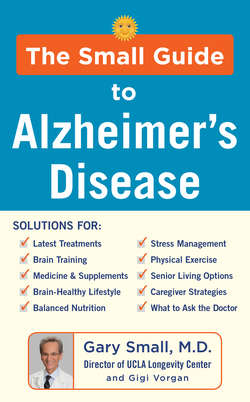Читать книгу The Small Guide to Alzheimer's Disease - Gary Small - Страница 19
На сайте Литреса книга снята с продажи.
Beware of Anticholinergic Drugs
ОглавлениеMany people are not aware of the fact that over-the-counter medicines for allergies (diphenhydramine or Benadryl) or sleep (e.g., Sominex, which also contains diphenhydramine) are anticholinergic. This means that they counter the effects of acetylcholine, a neurotransmitter or brain messenger important for normal memory function. In fact, several of the drugs approved for the treatment of Alzheimer’s symptoms are effective because they boost the function of this brain messenger. Drugs with anticholinergic properties have been used to treat many symptoms of medical conditions, such as asthma, chronic obstructive pulmonary disease, diarrhea, epilepsy, gastrointestinal problems, insomnia, motion sickness, overactive bladder or urinary incontinence, Parkinson’s disease, psychiatric disorders (depression, psychosis, anxiety), muscle relaxation or anesthesia during surgery, and toxicity of certain poisonings.
Medicines with even mild anticholinergic effects may impair memory function in middle-aged and older adults with minimal age-related cognitive complaints. A recent study published in JAMA Internal Medicine showed that prolonged exposure to several kinds of strong anticholinergic drugs is associated with a greater risk for developing dementia. In that study, Dr. Carol Coupland and her colleagues studied hundreds of thousands of people in the United Kingdom and found that prolonged exposure to anticholinergic antidepressants, anti-Parkinson’s drugs, antipsychotics, bladder anti-muscarinic drugs, and antiepileptic drugs all increased dementia risk. For older people who used the minimum effective daily dose of a single, strong anticholinergic medication over three years, the investigative team found a nearly 50 percent increased risk for developing dementia within a 10-year period.
People with myasthenia gravis, hyperthyroidism, glaucoma, enlarged prostate, high blood pressure, urinary tract blockage, increased heart rate (tachycardia), heart failure, severe dry mouth, hiatal hernia, severe constipation, liver disease, Alzheimer’s disease, or Down syndrome should avoid using these medicines. If you are taking a medication that you think may be exposing you to anticholinergic effects that might be impacting your memory, consult with your doctor to determine if there is an alternative medication you can substitute.
Anticholinergic Medicines That May Impair Memory
The following is a list of medicines with known anticholinergic properties:
| Stronger Effects | |
|---|---|
| Amitriptyline (Elavil) Atropine Benztropine (Cogentin) Chlorpheniramine (e.g., Actifed) Chlorpromazine (Thorazine) Clomipramine (Anafranil) Clozapine (Clozaril) Cyclobenzaprine (e.g., Flexeril) Cyproheptadine (Periactin) Desipramine (Norpramin) Dexchlorpheniramine Dicyclomine (Bentyl) Diphenhydramine (e.g., Advil PM, Benadryl, Nytol, Sominex) Doxepin (Adapin, Sinequan) Hydroxyzine (Atarax, Vistaril) Hyoscyamine (e.g., Anaspaz) Orphenadrine (Norflex) | Imipramine (Tofranil) Meclizine (Antivert, Bonine) Nortriptyline (Pamelor) Olanzapine (Zyprexa) Oxybutynin (Ditropan, Oxytrol) Paroxetine (Brisdelle, Paxil) Perphenazine (Trilafon) Prochlorperazine (Compazine) Promethazine (Phenergan) Protriptyline (Vivactil) Pseudoephedrine HCl / Triprolidine HCl (Aprodine) Scopolamine (Transderm Scop) Thioridazine (Mellaril) Tolterodine (Detrol) Trifluoperazine (Stelazine) Trimipramine (Surmontil) |
